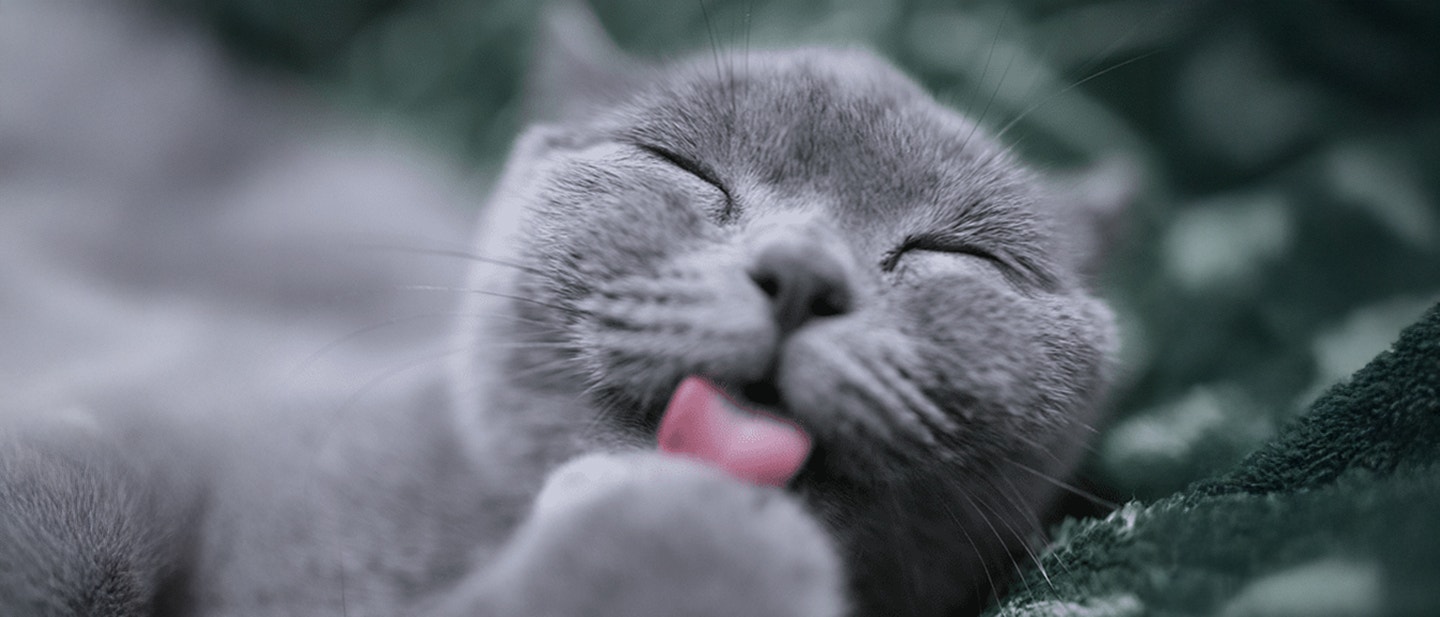
UNDERSTANDING AND SOLVING THE PROBLEM OF OVERGROOMING IN CATS

Article checked by a vet
Cats love to groom themselves and keep their coats gloriously clean. However, if your cat is spending a lot of time grooming, you may be wondering why your cat is overgrooming. Overgrooming is usually due to an underlying cause that needs to be resolved first, and can cause many issues for your cat including hair loss and damaged skin. In this article, we help cat owners understand what cat overgrooming is, the common symptoms and causes, and how to help your cat’s excessive grooming behaviour.
However, if your cat is overgrooming this means they are spending an abnormal amount of time grooming themselves beyond basic hygiene and comfort needs. If the cause is not medical, this would be considered behavioural overgrooming. You will know if your cat is excessively grooming if you find bald patches, nibbled fur, or red, sore patches of skin within their coat. Certain areas are easier for your cat to reach, which is why your cat may be overgrooming their back legs or tummy. We provide more detail on signs and symptoms of cat overgrooming below.
Signs your cat is overgrooming
It may be tricky for owners to detect whether their cats are overgrooming simply by watching them. This is because cats feel more relaxed in their owner’s presence, and therefore may not resort to this comforting behaviour as much around you.
However, there are several other signs your cat is overgrooming:
- Obsessively licking their fur
- Patches of nibbled fur
- Hair loss and visible bald patches
- Areas of short stubble
- Skin lesions and abrasions
- Red, irritated skin and rashes
- Pus on scabbed areas
- Irritability whilst grooming
If your cat is overgrooming, this will be most noticeable in areas that are easy for your cat to lick, such as their chest and abdomen or you may even notice cats overgrooming their back legs. By licking and chewing their fur repeatedly in the same areas, it can lead to hair loss which will create bald patches and short stubble. Cats can also damage their skin by overgrooming, resulting in skin sores and scabs.
Cats overgrooming is usually a sign of stress, which the overgrooming cannot resolve, therefore, your cat will likely be irritated whilst grooming but still continuing the compulsive behaviour. There are different possible reasons why your cat is overgrooming, explained further below.
What causes overgrooming in cats?
Cat overgrooming can be caused by either physical, psychological or environmental factors.
Physical causes of cats overgrooming
Often, the reason your cat is overgrooming is due to a parasite such as fleas. If your cat has fleas, they will bite your cat’s skin leaving behind flea saliva which can cause sensitive cats to feel itchy. Fleas commonly gather around your cat’s neck, base of their tail or on their legs, which is why your cat may be overgrooming their back legs. By licking their fur, cats are trying to scratch that itch - but if fleas are still present, this will not improve the problem. You can learn more about what fleas look like on cats and how to tackle them.
Cats can also have allergies to things in the environment or food, so if you’ve recently changed their diet then this could be the cause. Alternatively, your cat may have parasites or fungal skin infections, both of which cause itchiness and can lead to overgrooming. Hyperthyroidism can also affect your cat’s coat and cause some cats to overgroom.
Psychological causes of cats overgrooming
If your cat is not overgrooming due to an underlying medical issue, then they could be suffering from stress. Cats are creatures of habit, and prefer consistency in their daily routine. Therefore, a sudden change in environment can be stressful to cats. This could be either the introduction of a new pet or person in the home, or similarly an absence of a pet or person due to death or separation. If you’ve recently moved homes, rearranged furniture or renovated your current home, cats may also find this stressful and therefore overgroom to comfort themselves.
Environmental causes of cats overgrooming
Although environmental causes are less likely to cause a compulsive disorder of overgrooming, cats may be inclined to this behaviour as a way to self-soothe. If your cat spends a lot of time alone, with little play and interaction from a pet parent, they may overgroom as they are bored. Cats who are experiencing territorial issues with other outdoor cats may also overgroom as a marking behaviour, to mark their scent and territory.
How to treat cats overgrooming
It’s essential to consult a vet to first rule out any medical illnesses and for an official diagnosis of stress, if applicable. Once you’ve figured out why your cat is overgrooming, you can begin to resolve the underlying cause and improve their behaviour. You can take steps to make your home environment stress-free by establishing a daily routine and providing mental enrichment for your cat.
Consult with your vet to identify & treat physical causes
As mentioned, it’s essential to take your cat to the vet when you notice signs of overgrooming, in case it is a medical issue.
You can check your cat for fleas at home, and use vet-prescribed spot-on treatment regularly to keep your cat flea-free. If your cat has a food or environmental allergy, veterinary dermatologists can carry out allergy testing. Vets are also able to run blood tests, skin biopsies, diagnostic tests and lab work to determine what is causing your cat’s overgrooming.
If your cat is overgrooming due to anxiety, your vet may prescribe anti-anxiety medication for a short period to manage the compulsive behaviour and improve your cat’s stress levels. In the meantime, they may also prescribe anti-inflammatory skin cream to manage skin sores caused by cats' excessive overgrooming.
Create a calm and stress free environment
It’s important to keep your home environment stress-free to reduce anxiety in your cat. When introducing a new pet or person in the home, try to do this slowly to give your cat time to get familiar. Alternatively, if the absence of someone causes anxiety for your cat, you can use a clothing item with their scent to offer comfort. There are also pheromone sprays and diffusers that can calm a stressed cat. You should never punish your cat for overgrooming, as this will only make them feel more stressed.
Establish a consistent routine for your cat
Since cats thrive on routine, it’s best to keep consistency in their daily activities. You should have regular feed times and dedicated times for interactive play so your cat knows what to expect in their day-to-day life. This removes unpredictability from their day, and cats will feel more at ease.
Provide enrichment to stimulate your cat
The best medicine for stressed cats is play. There are various games for cats that will help build your bond and create positive experiences, which may help tackle their anxiety. You can purchase new toys to keep your cat busy, or make your own at home such as rolled-up balls of paper. Puzzle feeders are small cat toys that dispense a kibble or treat when cats roll it in a certain way and are a great way to stimulate your cat. By playing with your cat, they will feel soothed by your affection and attention, and by keeping them entertained and occupied, you can distract them from their overgrooming behaviour.
Whilst cat overgrooming is not dangerous, it’s important to determine what is causing your cat to overgroom and try to resolve this first. This can take time, may require vet appointments, and trial and error to find the source of the issue. Unfortunately, overgrooming as a reaction to stress is a compulsive behaviour, and if this has become a learned behaviour for your cat to deal with stress, it may reappear any time your cat is feeling anxious. Cats may also engage in other undesired behaviours when stressed, such as spraying, and you can learn more about how to stop cats spraying here.
